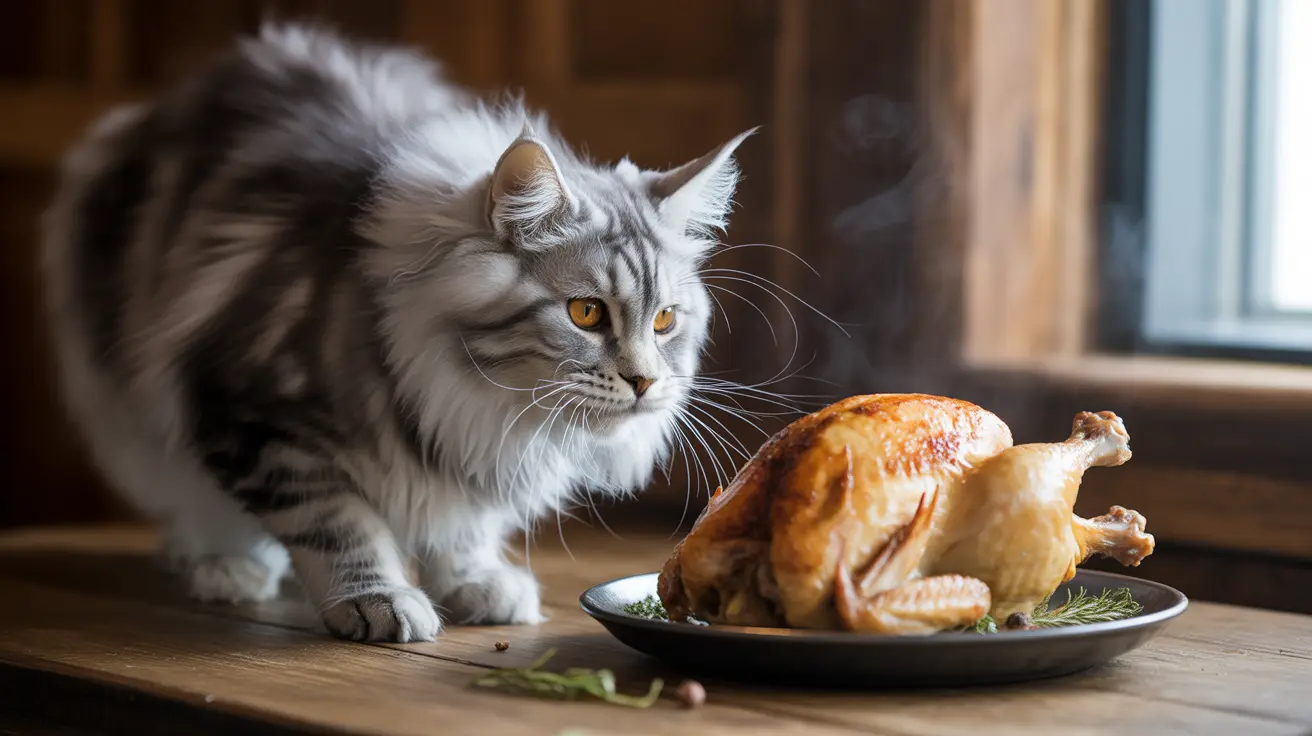If you've ever brought home a warm, aromatic rotisserie chicken from the grocery store, you've likely noticed your cat's immediate interest. While it might be tempting to share this convenient meal with your feline friend, veterinary experts warn against feeding rotisserie chicken to cats due to several serious health risks.
Understanding why rotisserie chicken poses dangers to cats can help protect your pet from potentially harmful consequences. Let's explore the risks and learn about safer alternatives for treating your cat.
The Hidden Dangers of Rotisserie Chicken for Cats
Store-bought rotisserie chicken contains numerous ingredients that can be harmful or even toxic to cats. The primary concerns include:
- Excessive sodium content (often over 500mg per serving)
- Toxic seasonings like garlic and onion powder
- High-fat content, especially in the skin
- Potentially dangerous preservatives and additives
- Brittle, cooked bones that can splinter
Seasonings and Additives: A Major Health Risk
Commercial rotisserie chickens are typically prepared with various seasonings and marinades that can be toxic to cats. Garlic and onion, common ingredients in these preparations, can cause serious health issues in cats, including damage to red blood cells and potentially fatal anemia.
The Sodium Problem
A single serving of rotisserie chicken often contains more sodium than a cat should consume in multiple days. This excessive salt intake can lead to:
- Dehydration
- High blood pressure
- Kidney problems
- Sodium ion poisoning
- Heart issues
Safe Ways to Feed Chicken to Your Cat
If you want to give your cat chicken as a treat, follow these guidelines:
- Use plain, boneless chicken breast
- Cook without any seasonings or oils
- Remove all skin and visible fat
- Ensure it's thoroughly cooked
- Serve in small, bite-sized pieces
Proper Portion Control
Even when feeding safe, plain chicken, moderation is crucial. Treats should make up no more than 10% of your cat's daily caloric intake, with the majority coming from complete and balanced cat food.
What to Do If Your Cat Eats Rotisserie Chicken
If your cat manages to sneak some rotisserie chicken, monitor them for these symptoms:
- Vomiting or diarrhea
- Lethargy
- Excessive thirst
- Unusual behavior
- Difficulty breathing
Contact your veterinarian immediately if you notice any of these signs, especially if your cat has consumed seasoned skin or bones.
Frequently Asked Questions
Can cats safely eat rotisserie chicken or is it harmful to them?
No, rotisserie chicken is not safe for cats due to its high sodium content, potentially toxic seasonings, and additives that can cause health problems in felines.
What are the dangers of the seasonings and additives in rotisserie chicken for cats?
Seasonings like garlic and onion powder can cause anemia in cats, while high sodium levels can lead to dehydration, kidney problems, and other serious health issues.
How should chicken be prepared if I want to give it as a treat to my cat?
Chicken should be plain-cooked (boiled or baked) without any seasonings, oils, or marinades. Remove all skin, fat, and bones before serving.
Why is chicken skin and cooked bones from rotisserie chicken risky for cats?
Chicken skin is high in fat and absorbs seasonings that can be toxic to cats. Cooked bones can splinter easily, potentially causing choking or internal injuries.
What symptoms should I watch for if my cat accidentally eats rotisserie chicken?
Watch for vomiting, diarrhea, lethargy, excessive thirst, and difficulty breathing. Contact your veterinarian if you notice any of these symptoms.
Conclusion
While chicken can be a healthy protein source for cats when properly prepared, rotisserie chicken poses too many risks to be considered safe. Stick to plain, unseasoned chicken or high-quality commercial cat food to keep your feline friend healthy and happy.






